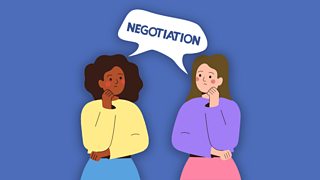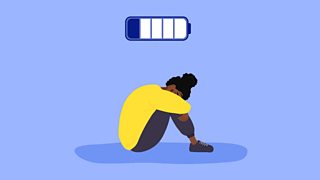Are you exhausted? How to spot the signs and why hobbies could help

How often do you feel weary and depleted? Or perhaps just plain exhausted?
Anna Schaffner knows these feelings well. In her previous life as an academic she suffered from burnout. Now she works as a coach specialising in helping those who are exhausted, and has written a book, Exhausted: An A-Z for the Weary.
Anna joined Emma Barnett on ���˿��� Radio 4’s Woman’s Hour to discuss why we might be feeling this way, how we can spot the signs, and her advice for dealing with it. Keep reading for her experience...
‘Your body says: No, you can no longer function’
“Exhaustion is a spectrum”, says Anna. “Burnout is at the extreme end of that spectrum. When we suffer from proper burnout, we can often no longer function at work. We have to stop working completely. Burnout really means that your body says: ‘No, you can no longer function’.
“We can also be exhausted in such a way that we can function, which is called burn on. We have very low energy reserves, but we can continue to function.
“But burnout is a diagnosis with very specific symptoms, and they include chronic fatigue (that isn't curable by resting) and also a sense of reduced efficacy that we can't really manage our workload anymore.
“Exhaustion can threaten the very core of our being. When we feel truly depleted, everything costs us energy we don’t have. It can make us feel like zombies – neither dead nor alive. We become alienated from our emotions, our needs, and our dreams.”
‘It sucked all the joy out of my life’
In Anna’s previous life as an academic and Professor of Cultural History at the University of Kent, she began to feel these symptoms herself. She soon realised she was experiencing burnout.
“I was becoming not just exhausted, but also irritable, bitter... I felt very sorry for myself,” says Anna. “I didn't enjoy work anymore. I was in a very toxic working environment. I noticed that it impacted on my whole being and that the suffering at work sucked all the joy out of my life. When we suffer at work, that suffering bleeds into all aspects of our life. When I realised that I slowly started to prepare for an exit.”

But what leads to us feeling this way?
"Our exhaustion has both outer and inner causes,” says Anna. “Outer causes can include toxic working environments where workloads are too high, where we have bad managers, a lack of community, no boundaries, where we have an 'always on' culture, and where we feel underappreciated.
“We may simply feel overwhelmed by the complexities and challenges of our age. And we may have internalised profoundly unhelpful narratives about time and work that have much older roots in religious frameworks in which wasting time and laziness were thought of as deadly sins.
“We can also be exhausted because of inner causes, including perfectionism or a hyperactive inner critic. Maybe you have an inner voice that drags everything you do into the mud and that berates you and judges you. That's almost like a form of self-bullying that uses up our energy from within.
“It's easy to get trapped in a very common scenario: The more overwhelmed and behind we feel with our to-do lists, the more we try to work to catch up. In other words, we work longer and longer hours, and we cut pauses and sleeping hours. That creates a vicious circle. Because we don't rest enough anymore, our capacity to work becomes even more diminished.”
So, what can we do to prevent burnout and stop ourselves from getting exhausted?
1. Know yourself – understand what gives you energy and what costs you energy
“A good starting point is to reflect on our natural preferences,” says Anna. “What costs us energy and what gives us energy? Do we, for example, have an introverted preference or an extroverted one? Introverts need alone-time to recharge, whereas extroverts get their energy from being with other people.
“Do you spend most of your workdays inside or outside your comfort zone, i.e. on tasks that you find difficult and draining, or tasks that allow you to draw on your natural strengths?
“Try to focus your attention on what you can control, and (for now) accept what you cannot control. That way, you use your limited energy more wisely, in areas in which it can make a difference.”

2. Find something that energises you and that makes you feel alive – a hobby!
“When we're exhausted and when we lack energy, we tend to cut activities out of our lives and our lives shrink, our horizon of experiences becomes ever smaller,” says Anna. “That’s kind of intuitive, that we want to avoid expending energy. But it's also very dangerous because we cut out what has the potential to re-energise us, to nourish us.
“Hobbies can be powerful antidotes to exhaustion. They are not about achievement, success, status, or self-improvement. They serve no purpose other than making us happy. The example of doing jigsaw puzzles is beautiful, because when we are in that state, we need to do things for our soul, for ourselves, that are purely joy-giving.
“So rather than just cutting everything out of our lives when we feel very depleted, we need to remember what makes us feel alive and gives us peace and joy, and we need to try to bring more of that back into our lives.”
3. Nourish your soul
“Listen to music. Read a novel. Dance. Sweat. Watch a great film. Get out into nature. Share a secret with a friend. Do something that makes you feel something – anything!” says Anna. “Find something that can be what author Franz Kafka described as the ‘axe for the frozen sea inside us’ – whatever that may be.”
4. Check the narratives you live by
“What kinds of stories do you tell yourself about yourself?” says Anna. “Are they helpful or unkind? And what stories do you tell yourself about time, about productivity, about work, and about your value as a human being?
“If you find that your self-stories and the wider cultural narratives you may have internalised are unhelpful, begin simply by noticing these stories. Learn to spot and observe them when they pop in your head. And gradually, you may begin to tell yourself different, more nurturing kinds of stories.”
Anna says it can also be helpful to consider how important things like achievement, success and status are to you, and the price you’re willing to pay for them.
“We tend to pay for these things all too willingly in the currency of ‘life cost’ – the amount of time, health, mental wellbeing, effort, and attention we are willing to dedicate to something.”
So, according to Anna, you need to think about whether your ‘life-cost’ investment is worth the outcome.
You can hear more from Anna Schaffner speaking to Emma Barnett on ���˿��� Sounds - it's the Woman’s Hour episode from 16 January.
Join the conversation on and @bbcwomanshour.





